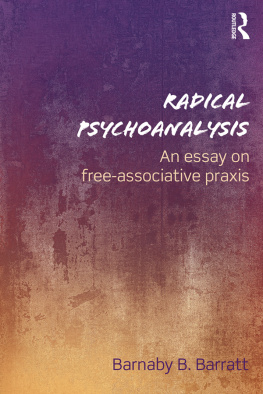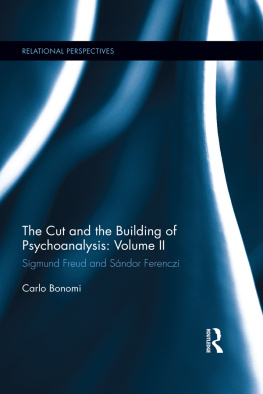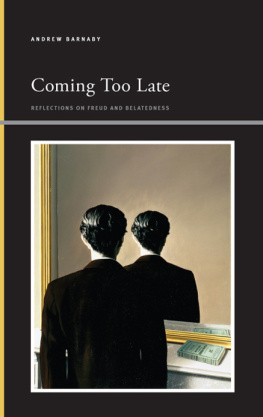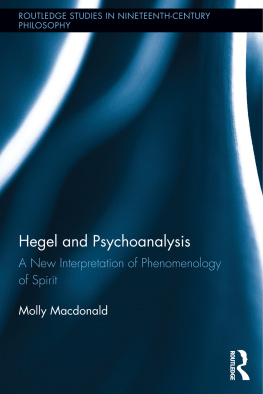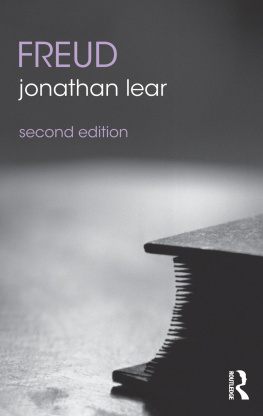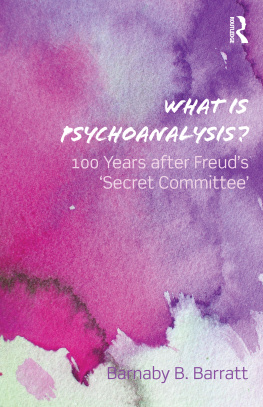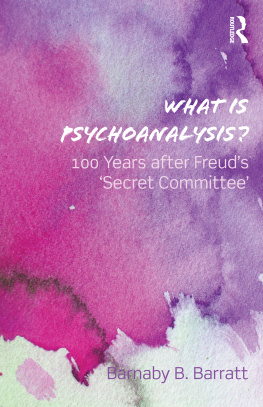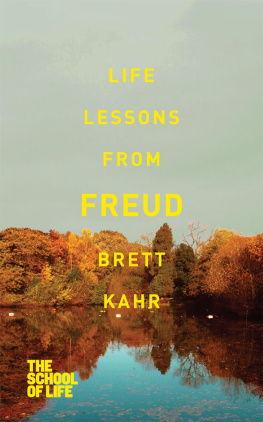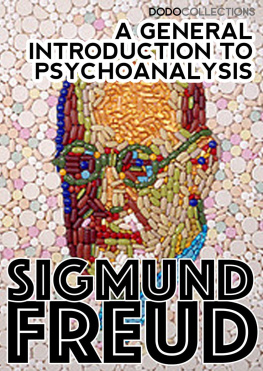RADICAL PSYCHOANALYSIS
Only by the method of free-association could Sigmund Freud have demonstrated how human consciousness is formed by the repression of thoughts and feelings that we consider dangerous. Yet today most therapists ignore this truth about our psychic life. This book offers a critique of the many brands of contemporary psychoanalysis and psychotherapy that have forgotten Freuds revolutionary discovery.
Barnaby B. Barratt offers a fresh and compelling vision of the structure and function of the human psyche, building on the pioneering work of theorists such as Andr Green and Jean Laplanche, as well as contemporary deconstruction, feminism, and liberation philosophy. He explores how drive or desire operates dynamically between our biological body and our mental representations of ourselves, of others, and of the world we inhabit. This dynamic vision not only demonstrates how the only authentic freedom from our internal imprisonments comes through free-associative praxis, it also shows the extent to which other models of psychoanalysis (such as ego-psychology, object-relations, self-psychology, and interpersonal-relations) tend to stray disastrously from Freuds original and revolutionary insights. This is a vision that understands the central issues that imprison our psychic livesthe way in which the reflections of consciousness are based on the repression of our innermost desires, the way in which our erotic vitality is so often repudiated, and the way in which our socialization oppressively stifles our human spirit.
Radical Psychoanalysis restores to the discipline of psychoanalysis the revolutionary impetus that has so often been lost. It will be essential reading for psychoanalysts, psychoanalytic psychotherapists, mental health practitioners, as well as students and academics with an interest in the history of psychoanalysis.
Barnaby B. Barratt has practised psychoanalysis in Michigan and now in South Africa. He was Professor of Family Medicine and Psychiatry at Wayne State University, and is now Senior Research Associate at the University of Witwatersrands Institute for Social and Economic Research. His previous work includes Psychic Reality and Psychoanalytic Knowing (Routledge, 1984), Psychoanalysis and the Postmodern Impulse (Routledge, 1993) and What is Psychoanalysis? 100 Years after Freuds Secret Committee (Routledge, 2013).
This brilliantly conceptualized and carefully constructed argument that psychoanalysis must return to Freuds most revolutionary method is not simply timely, but essential to the growth of psychoanalytical theory and practice.
Christopher Bollas, from the Foreword
This book is full of passion, a cri de coeur by a committed psychoanalyst. Dr Barratt advocates a return to Freud different from Lacans. He goes furthersearching for roots that even Freud forgot because of his need for scientific respectability. Barratt reminds us that the cornerstone of psychoanalysis is Freuds method of free-association, which opens and exposes the repressed unconscious that is rooted in the fleshthe way of listening to our drives, which are virtually infinite vectors of freedom of thought. One should read this book!
Marilia Aisenstein, Paris Psychoanalytic Society
Free-association is the radical psychoanalytic clinical position that Dr Barratt faces head on and with subtle complexity of technique, philosophy and history. Skillful descriptions of Freuds theory building and metapsychology together with a constant gaze on the ethics of psychoanalysis are woven together in a rethought history that becomes the readers constant companion. For Barratt interpretation must always be subordinated to the ongoing quest for a free-associative matrix. This is a tour-de-force!
Dr Jonathan Sklar, British Psychoanalytic Society
Radical Psychoanalysis underlines Freuds emphasis on the method of free-association as what is essential, central and defining for psychoanalysis. It is, as the author puts it, a method that uniquely discloses, and to a certain extent undoes, the repressiveness of human self-consciousness. Dr Barratt rightly calls his text a manifesto which urges us to commit existentially to the method of free-association. Its liberatory intent succeedsreading it moves us into the workplay of lived experience at its center. Laplanche and Green to whom the book is dedicated would be pleased.
Dr Jonathan House, American Psychoanalytic Association
RADICAL PSYCHOANALYSIS
An essay on free-associative praxis
Barnaby B. Barratt
First published 2016
by Routledge
2 Park Square, Milton Park, Abingdon, Oxon OX14 4RN
and by Routledge
711 Third Avenue, New York, NY 10017
Routledge is an imprint of the Taylor & Francis Group, an informa business
2016 Barnaby B. Barratt
The right of Barnaby B. Barratt to be identified as author of this work has been asserted by him/her in accordance with sections 77 and 78 of the Copyright, Designs and Patents Act 1988.
All rights reserved. No part of this book may be reprinted or reproduced or utilised in any form or by any electronic, mechanical, or other means, now known or hereafter invented, including photocopying and recording, or in any information storage or retrieval system, without permission in writing from the publishers.
Trademark notice: Product or corporate names may be trademarks or registered trademarks, and are used only for identification and explanation without intent to infringe.
British Library Cataloguing in Publication Data
A catalogue record for this book is available from the British Library
Library of Congress Cataloging in Publication Data
Names: Barratt, Barnaby B., 1950 author.
Title: Radical psychoanalysis : an essay on free-associative praxis / Barnaby B. Barratt.
Description: 1 Edition. | New York : Routledge, 2016. |
Includes bibliographical references.
Identifiers: LCCN 2015045895| ISBN 9781138954847 (hardback) |
ISBN 9781138954854 (pbk.) | ISBN 9781315666723 (ebook)
Subjects: LCSH: Psychoanalysis. | PostmodernismPsychological aspects.
| Freud, Sigmund, 18561939.
Classification: LCC BF173 .B205 2016 | DDC 150.19/52dc23
LC record available at http://lccn.loc.gov/2015045895
ISBN: 978-1-138-95484-7 (hbk)
ISBN: 978-1-138-95485-4 (pbk)
ISBN: 978-1-315-66672-3 (ebk)
Typeset in Bembo
by Florence Production, Stoodleigh, Devon, UK.
May all beings be happy and free; may these writings contribute to the happiness and freedom of all beings.
In appreciation of the contributions of Andr Green (19272012) and Jean Laplanche (19242012), whose scholarship and independence of thought should be a model for every genuine psychoanalyst.
CONTENTS
by Christophe Bollas
This brilliantly conceptualized and carefully constructed argument that psychoanalysis must return to Freuds most revolutionary methodthe free associating psychoanalys and the free listening psychoanalystis not simply timely, but essential to the growth of psychoanalytical theory and practice. Dr Barratt explores the place of this praxis in the history of ideas and methods, integrates the many sources of free associationbiological, neuronal, hormonallinked to the drives that generate representation, and challenges psychoanalysts to note that however tempting it is to use the freely associated as the material of interpretation, it is the act of free association itself that supersedes its epistemic yield.

